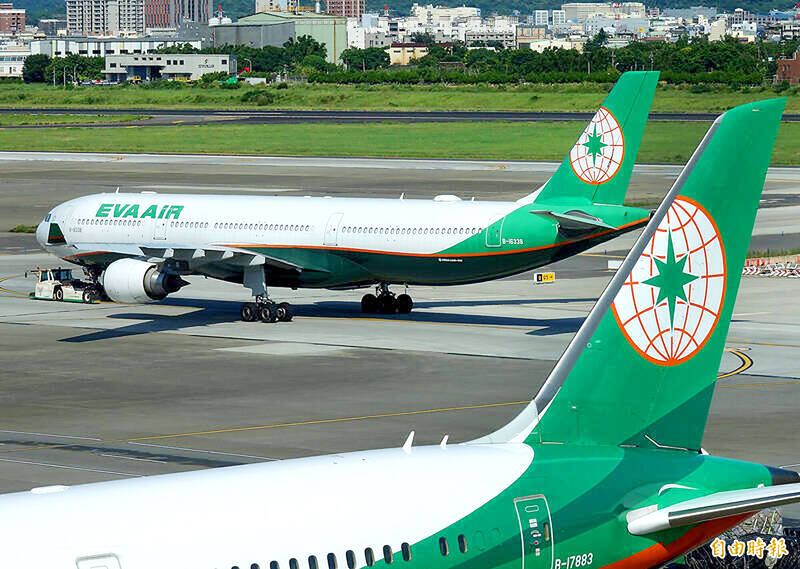EVA Air is prohibiting the use of portable chargers on board all flights starting from Saturday, while China Airlines is advising passengers not to use them, following the lead of South Korean airlines.
Current regulations prohibit portable chargers and lithium batteries from check-in luggage and require them to be properly packed in carry-on baggage, EVA Air said.
To improve onboard safety, portable chargers and spare lithium batteries would be prohibited from use on all fights starting on Saturday, it said.

Photo: Tsai Yung-jung, Taipei Times
Passengers are advised to fully charge electronic devices before boarding and use the AC and USB charging outlets at their seat, it said.
South Korea implemented a similar ban on Feb. 13 as a precaution against potential battery fires, following an incident last month in which an Air Busan aircraft caught fire, although the exact cause remains unclear.
China Airlines said that passengers must carry portable charges with them and cannot pack them in checked baggage for safety reasons.
Passengers are advised not to use portable charges while on board flights, it said.
Mandarin Airlines, China Airlines’ regional airline company, follows the same regulations.
Starlux Airlines has banned the use of portable chargers on board since the airline’s launch in 2018.
The airline advised passengers to use the charging ports provided near their seats.
Additional reporting by Tsai Yun-jung

Alain Robert, known as the "French Spider-Man," praised Alex Honnold as exceptionally well-prepared after the US climber completed a free solo ascent of Taipei 101 yesterday. Robert said Honnold's ascent of the 508m-tall skyscraper in just more than one-and-a-half hours without using safety ropes or equipment was a remarkable achievement. "This is my life," he said in an interview conducted in French, adding that he liked the feeling of being "on the edge of danger." The 63-year-old Frenchman climbed Taipei 101 using ropes in December 2004, taking about four hours to reach the top. On a one-to-10 scale of difficulty, Robert said Taipei 101

Nipah virus infection is to be officially listed as a category 5 notifiable infectious disease in Taiwan in March, while clinical treatment guidelines are being formulated, the Centers for Disease Control (CDC) said yesterday. With Nipah infections being reported in other countries and considering its relatively high fatality rate, the centers on Jan. 16 announced that it would be listed as a notifiable infectious disease to bolster the nation’s systematic early warning system and increase public awareness, the CDC said. Bangladesh reported four fatal cases last year in separate districts, with three linked to raw date palm sap consumption, CDC Epidemic Intelligence

Two Taiwanese prosecutors were questioned by Chinese security personnel at their hotel during a trip to China’s Henan Province this month, the Mainland Affairs Council (MAC) said yesterday. The officers had personal information on the prosecutors, including “when they were assigned to their posts, their work locations and job titles,” MAC Deputy Minister and spokesman Liang Wen-chieh (梁文傑) said. On top of asking about their agencies and positions, the officers also questioned the prosecutors about the Cross-Strait Joint Crime-Fighting and Judicial Mutual Assistance Agreement, a pact that serves as the framework for Taiwan-China cooperation on combating crime and providing judicial assistance, Liang

US climber Alex Honnold left Taiwan this morning a day after completing a free-solo ascent of Taipei 101, a feat that drew cheers from onlookers and gained widespread international attention. Honnold yesterday scaled the 101-story skyscraper without a rope or safety harness. The climb — the highest urban free-solo ascent ever attempted — took just more than 90 minutes and was streamed live on Netflix. It was covered by major international news outlets including CNN, the New York Times, the Guardian and the Wall Street Journal. As Honnold prepared to leave Taiwan today, he attracted a crowd when he and his wife, Sanni,